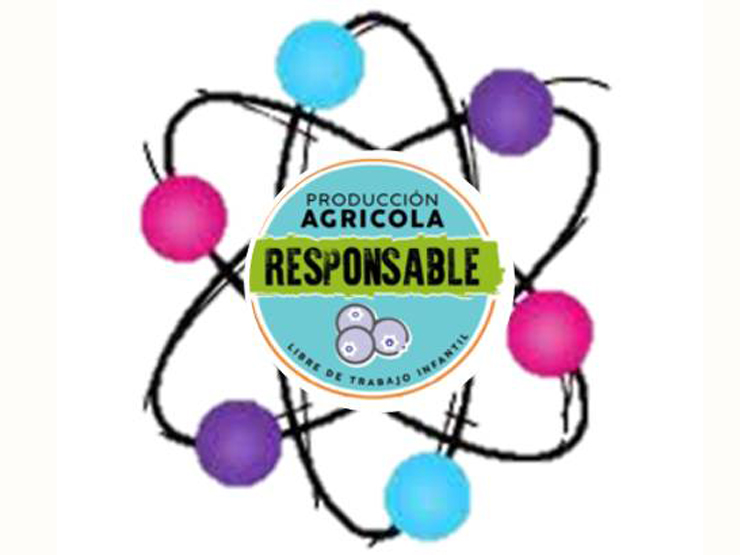
ABC partner companies are implementing a Social Compliance System this season that will engage 40% of the country production with concrete actions under the commitment to prevent child labor.
The 2021 season will not be just one more season in the history of blueberry production in Argentina. It will be historical because it will be the first season in which partner companies of the Argentine Blueberry Committee (ABC) will implement the Social Compliance System: a system that the sector designed to put into action its commitment to responsible and child labor-free production, with a focus on promoting education in production areas.
In 2020, despite the pandemic, some ABC partner companies tested the system in its three main components: prevention, monitoring and care. After successful testing, by 2021, 40% of Argentine blueberry production will be under this production model.
“Our social commitment and the flavor of our fruit make Argentine blueberry a unique and different product,” according to ABC.
“At first, child labor is an issue that nobody wants to address, but few years ago ABC took the initiative to promote preventive actions and carry out responsible agriculture. Our companies are a set of values, dreams and objectives and we want to work under this premise,” explained Alejandro Pannunzio, president of ABC. “We decided not to point the finger at others but to consider what we can do on our own. There are no thriving sectors in countries that do not progress,” he added.
The Committee recognizes that child labor is a multicomplex social problem and that “from a commercial point of view it can lead to many negative consequences, such as the closure of markets and the condemnation of the entire sector, therefore we want to transform this threat into an opportunity,” the Committee stated.
Triple impact business model
“Our product is not just a food product. There is another angle on how our fruit is produced. The final consumer notices a new aspect of quality: the way we do things. The new consumer is aware of social responsibility in the entire chain,” explains Francisco Estrada, producer and partner of the ABC.
“We have decided, as an industry, to change our business model to a socially responsible one where the education of boys and girls is key along with the prevention of CL. The market does not forgive such misconduct and we want to be pioneers in the world by working under a system that ensures there is no risk of CL being present in our productions,” he said.
The triple impact business model that the Argentine blueberry sector is developing has one clear objective: to ensure that the fruit has two added values: commercial and social.
How it is done
The Social Compliance System was designed by the members of the whole value chain of blueberry production in Argentina, with the technical assistance of Fundación DyA, an organization that specializes in this topic worldwide.
However, its implementation requires a four-party coordination that involves equal parts from the private sector, public sector, civil society and trade unions, with the key participation of RENATRE, the National Registry of Rural Workers and Employers.
Five points summarize key aspects of the SCS:
- The political decision of the whole sector: State, trade union, workers, producers and entrepreneurs.
- Participation of the entire value chain: workers, producers, entrepreneurs, contractors, and technicians, who all participated in training workshops on this subject.
- Public-private coordination: the three government levels are involved both in prevention, through controls during harvesting, and in care when a vulnerable situation that requires governmental assistance is detected.
- Partnerships with the Civil Society: social organizations as a key sector for technical assistance both in the design of the SCS and in providing care.
- Synergy with other production sectors: the blueberry sector is pioneer in designing the system, but blueberry male and female workers are, at other times of the year, workers in other sectors such as citrus, for example. The system is designed to provide continuity throughout the year for other crops as well.
The System
Has three components:
- Prevention: Training workshops for the entire value chain. It includes communication and social awareness-raising actions, in production communities, on the prohibition of child labor: signs on buses that transport workers, for example: manuals and prevention signs on gates. Community Services that the sector promotes together with public and workers’ organizations are also included in this instance: child care centers for harvesters’ children, spaces for digital connection and school assistance for teenagers who live in the production communities. Two Care Centers and two Youth Spot Centers have already been opened. There are two more under construction in the country.
- Monitoring: permanent control in the crews, both in the fields and in the transportation. The private sector takes part as the party responsible together with other public agencies. Technologies are implemented in the field, such as an app which controls access, screens entries and reports incidents. This app is used by foremen and contractors. Organizations such as RENATRE or the government, through Labor areas, take part in controls and inspections.
- Care: Public agencies such as the areas of Health, Social Development, Education and the private sector and NGOs are engaged in dealing with possible incidents reported by monitoring activities.
The process is in progress and challenges are huge, but our commitment and hard work are even more relevant in this new momentum taken by Argentine blueberries, fruit produced in a different way.






